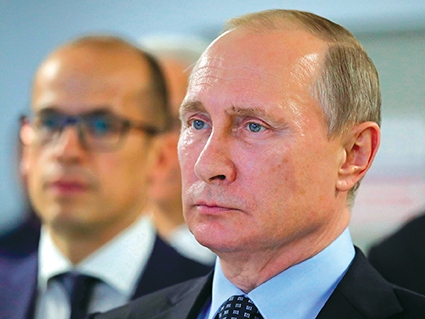Reassessing Putin’s Power
Op-Ed
Last weekend, Russia held regional and local elections which saw opposition forces making some notable progress in various areas of the country. But, overall, the ruling United Russia party is expected to win. What is important here, though, is that these elections were marked by the lowest possible turnout. In Moscow alone, only 15% of voters cast bulletins, and these elections are set to be the last before the next, presidential polls, scheduled for March 2018.
Putin is preparing for his fourth term, but there are clear signals that it will be tougher for him to explain to the Russians why he should be re-elected. There are many facts and arguments which could be used against him. For the past four years, there have been several serious failures on Russia’s part in foreign policy. When Euromaidan in 2014, Russia lost Ukraine. Moldova, Ukraine and Georgia further distanced themselves from Moscow by signing the EU Association Agreements in 2014. The countries have also considerably increased security and military talks with NATO and the US.
I have already written how Russia experiences problems with breakaway territories across the former Soviet Union. Previously, Moscow used the conflicts in Abkhazia, South Ossetia and Transnistria to limit the ability of those countries to enter the EU/NATO. Nowadays, Moscow’s ability to maneuver in so many diverse conflicts is becoming tougher. Various political players are trying to play their own game independently from Moscow, and anti-Russian sentiments are growing among the local population. There is also a geographic factor which complicates the Russian ability to project power. For instance, Transnistria, where Russia has approximately 2,000-1,500 troops as Russian soldiers and peacekeepers, was essentially separated from Russia once Ukraine closed transit routes through its territory.
Russian foreign policy misfortunes can also be seen in other directions. For example, in the past several years, Russian influence in the energy-rich Central Asia has receded. Despite the fact that Russia is the biggest military power in the region and has bases in Tajikistan and Kyrgyzstan, on the economic front there is a completely different story. China has substituted Russia as the region’s biggest trade and investment partner. Beijing has even made some progress in the security realm through holding exercises with Tajik and Kyrgyz militaries.
On a larger, geopolitical, level Russia is now feeling pressure from the US and the EU. It is unlikely that the sanctions imposed on Russia will be lifted any time soon and, despite Trump’s at times positive statements about Russia, the US’ overall foreign policy thrust is decidedly anti-Russian. The EU, too, is now much reinvigorated as Putin’s gamble to revive left-wing parties across the continent largely failed with Emmanuel Macron winning in France.
However, for the Kremlin, the situation inside the country is far more problematic. In his previous pre-election campaigns, Putin was building his bid on the Russian population’s wider needs, such as security against terrorism and Chechen insurgency, or the big economic progress which happened prior to 2014. Nowadays, however, Russian major media outlets revealed several indications that there is a lack of ideas which would be attractive to the Russians. This could potentially jeopardize Putin’s rule in the long run.
There is also another important development. More Russians are expressing their concerns as to why Putin’s presidency should continue for yet another term of six years. Putin has been in power for 17 years and in 2018 he will become Russia’s longest ruler since Stalin. Already, an entire generation of young Russians which has seen only Putin as Russia’s ruler, is expressing its discontent. And this is a very dangerous development for the Kremlin. Youngsters have become more opposition-minded in Russian society; for example, when country-wide protests hit Russia in 2016, most of protesters were of the younger generation.
Putin still has not found a platform on which to run. He could explain his participation by the need to oppose a unified western front against Russia. Protests have shown, however, that many Russians think that Russia-West standoff developed because of Putin’s mistakes. Other platforms such as the struggle against terrorism and separatism would not work as they did in the early 2000s. In other words, Putin still has to convince the Russians and particularly the younger of them, of the need for his continued rule.
If Putin wins his next presidential term, it is sure to be a far different one.
Emil Avdaliani












